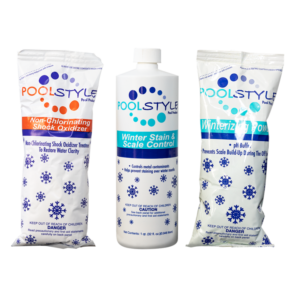
Common Winter Pool Problems (And Solutions That Work)
Between kids heading back to school, holiday gatherings, holiday shopping, and other obligations, the winter season can be hectic. However, that doesn’t mean your pool can fall to the back burner.
Every season presents some challenges and hiccups when it comes to swimming pool maintenance and keeping your pool in tip-top shape. Winter is no exception.
We’ve compiled a few of the common winter swimming pool problems we see and some steps you can take to avoid them.
Not properly securing your winter pool cover
Pool covers that are not secured and tightly wrapped around the pool can easily blow off during the winter months. That makes them less effective against winter weather and can allow snow, dirt, and debris in your pool.
How to keep winter pool cover from blowing off
- Make sure the pool cover is tightly secured with a cable and winch.
- In addition to the cable and winch, you can use milk jugs, wall bags, and cover clips to help keep your cover taut and smooth throughout the winter.
- Check it regularly throughout the season. If you notice your cover slipping or blowing around, simply pull to readjust and re-secure it down.

Water & debris collecting in the center of your cover
If you’re not careful, leaves, water, snow, and other debris can easily pile up on your pool cover throughout the winter season.
This can cause damage to the cover and make it less effective. Excess water can also freeze and cause big issues. In general, water and debris on your cover can create a big mess to deal with come spring.
How to keep debris off your pool cover
- Remove debris and clear the cover frequently. Rakes, hoses, and wet vacs are usually your best tools to keep your pool cover clean.
- Keep an eye on the weather so you can plan ahead for snow and windy days.
- Use a winter pool air pillow. Pool pillows protect your pool from expanding ice and create a more even weight distribution so the water doesn’t pool in the center and damage your liner.
Algae build-up
Not properly closing your pool or keeping up with maintenance can cause issues with algae. Algae growth can lead to stains on your pool liner, discoloration, and other damage to your pool liner and accessories.
How to prevent algae in your pool over winter
- Clean your pool well before closing. Be sure to scrub (gently) around hard-to-reach areas and the water line.
- Keep up with winter pool maintenance tasks. Setting alerts or using a pool app to keep track can be helpful — especially during the off-season when your pool isn’t necessarily top of mind.
- Check your water chemistry regularly. This will help keep things in check so you can avoid nasty surprises when the weather warms up.
- Keep your cover tight, as noted above, to prevent more dirt and debris from getting into your pool.
- Use the right winter pool chemical, including a pool shock treatment
 Not properly winterizing your pool
Not properly winterizing your pool
While this isn’t really a “pool issue” and more human error, it’s important to note here. Properly closing your pool for the winter is key to preventing major issues during the off-season and ensuring a quick and efficient pool open come spring.
Unfortunately, many pool owners try and rush through pool closing or don’t follow through, leading to damage to their pool liner, pump and filter system, and increased algae and bacteria growth. By closing your above ground pool properly, you can avoid a lot of the issues noted above.
What to do:
- Be sure to check out our guide for winterizing your above ground pool to get you on the right track.
- Take your time on the closing process. Spending more time now to do it right will save you headaches, time, and money when it’s time to open your pool in the spring.
- Follow all instructions and guidelines outlined by the manufacturer. This will ensure proper winterization, storage, and extend the life of your swimming pool liner, floats, and other accessories.
- Close your pool when the temperature remains consistently below 65 degrees Fahrenheit for best results.
- Work with a swimming pool professional if you’re unsure how to properly close your pool or maintain it during the winter months.
What’s next?
These tips will put you well on your way to a smooth and issue-free winter season for your swimming pool.
If you’re in need of a solid winter pool cover, winter chemicals, and other pool supplies to set you up for the summer season, be sure to check out the latest products and deals from LinerWorld (while supplies last)!
Shop LinerWorld winter pool products & accessories now!
- In-ground Safety Pool Cover
- Above Ground Winter Pool Cover
- Winter Pool Air Pillow
- Swimming Pool Winterizing Kit
Also, don’t miss these other pool resources…
Don’t Make These Common Winter Pool Closing Mistakes
Handy Tips For Dealing with Leaves In Your Pool
Extend Your Outdoor Pool Season with these Tips
Above Ground Pool Winter Maintenance Guide
Do I Need A Winter Pool Pillow?
Everything You Need to Know About Winterizing Your Above Ground Swimming Pool
Last updated: 10/5/2023



